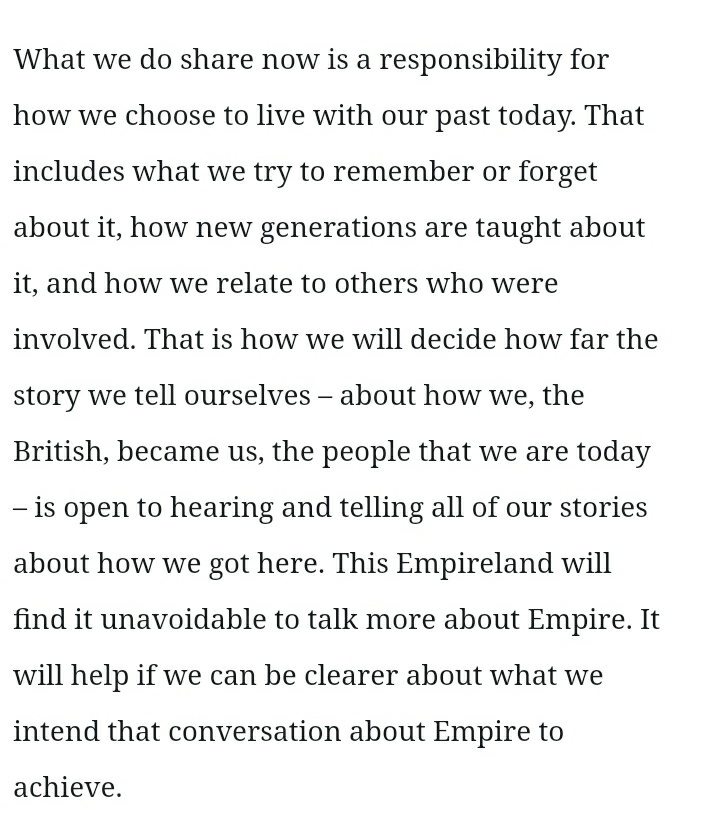The Church of England is asking its parishes and Cathedrals to review monuments relating to histories of slavery, colonialism and contested history. The guidance places an emphasis on local dialogue, on an issue which can become binary and polarised https://www.theguardian.com/world/2021/may/09/remove-or-alter-your-slavery-monuments-churches-are-told?CMP=Share_iOSApp_Other">https://www.theguardian.com/world/202...
Recent @britishfuture research shows views differ both within & between ethnic groups. A binary debate about what to remove creates polarising flashpoints, Need local dialogue about how to contextualise, what missing contributions to recognise, removal (rarely) in egregious cases
Starting with "what to remove" flashpoints can risk losing a latent consensus about the need for dialogue on how to reflect on and understand a complex, contested history, and what approaches to what we recognise and how might follow from that
Church will be cross-pressured in culturally polarised debate (cf National Trust) given demographics + interest in its heritage from nominal Christian identifiers. Its most important contribution would be to become a site of dialogue + meaningful contact, nationally & locally
My thoughts on how to talk about statues, monuments and contested history without fuelling cultural polarisation https://capx.co/how-talking-more-about-our-history-can-defuse-a-culture-war/">https://capx.co/how-talki...
C of E is right that avoidance is not an option. What the conversation is about & what it is seeking to achieve is crucial in framing dialogue & action that explores contested history in ways that improve inclusion today.
How should we talk about Empire
https://capx.co/we-need-to-talk-about-the-british-empire/">https://capx.co/we-need-t...
How should we talk about Empire
https://capx.co/we-need-to-talk-about-the-british-empire/">https://capx.co/we-need-t...
Each of our ten local groups around the UK all saw this as an important & necessary conversation, especially in schools, with a range of views about the emphasis of how to get it right, and an awareness both that it is somewhat overdue but could be a theme that divides people too
Most challenging aspect is that broad latent public consent often insufficient to avoid "culture war" crossfire (because social media + national media + political dynamics amplify poles). CofE could learn from eg National Trust debate to anticipate & navigate these choppy waters
This perception is a related challenge, particularly the generational and inter-ethnic dynamics. Without well structured engagement, the broad middle group who have a vital role in bridging efforts may lean out of engaging in a more polarised debate https://twitter.com/sundersays/status/1387297632951967744?s=19">https://twitter.com/sundersay...
From "Race and opportunity in Britain. Finding Common Ground" published a month ago. (I have more detail on the dynamics of contested history/identity than we could fit into this report; will link the tables). https://www.britishfuture.org/publication/race-and-opportunity-in-britain-finding-common-ground/">https://www.britishfuture.org/publicati...
Fullt tables here of these two large research surveys across majority & minority opinion. I have got summaries of the contested history findings & breaks separately. Am happy to share with other people researching or working on this theme. https://twitter.com/NCPoliticsUK/status/1377175844351664131?s=19">https://twitter.com/NCPolitic...
Most people had not heard of Colston before his statue was removed. There was a post hoc public majority for removal (legally) in this case of a person so centrally involved in slave trade. (That would be a case by case view, applicable to egregious cases) https://twitter.com/sundersays/status/1270015385887178757?s=19">https://twitter.com/sundersay...

 Read on Twitter
Read on Twitter







